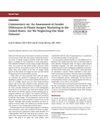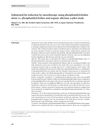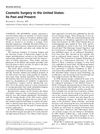 3 citations,
May 2011 in “Journal of the American Academy of Dermatology”
3 citations,
May 2011 in “Journal of the American Academy of Dermatology” A woman's excessive hair growth around a leg ulcer was linked to a treatment with Prostaglandin E1 ointment.

Surgeons should evaluate new technologies critically, offer a range of services including non-surgical options, and be aware of marketing influences to meet patient needs and maintain a successful practice.
 153 citations,
October 2012 in “Skin Pharmacology and Physiology”
153 citations,
October 2012 in “Skin Pharmacology and Physiology” Caffeine in cosmetics may reduce cellulite, protect skin, and stimulate hair growth, but more research is needed on its use and effects.
[object Object]  14 citations,
January 2012 in “International Journal of Dermatology”
14 citations,
January 2012 in “International Journal of Dermatology” A woman got a rare condition called oleoma after cellulite treatment, which left scars even after treatment.
 6 citations,
April 2013 in “Alternative and Complementary Therapies”
6 citations,
April 2013 in “Alternative and Complementary Therapies” Raspberry ketone lacks sufficient human research to support health benefit claims and requires more rigorous studies to confirm its safety and effectiveness.
 5 citations,
January 2012 in “Hair therapy & transplantation”
5 citations,
January 2012 in “Hair therapy & transplantation” Hair mesotherapy might help with certain types of hair loss but lacks strong scientific proof and has some risks.
 2 citations,
September 2004 in “International Journal of Cosmetic Science”
2 citations,
September 2004 in “International Journal of Cosmetic Science” Hair quality is genetically determined and linked to its composition and strength.
 July 2020 in “IP International Journal of Maxillofacial Imaging/International journal of maxillofacial imaging/IP International journal of maxillofacial imaging”
July 2020 in “IP International Journal of Maxillofacial Imaging/International journal of maxillofacial imaging/IP International journal of maxillofacial imaging” Mesotherapy might be a good and safe way to treat hair loss, refresh skin, and reduce dark spots, with quick treatment times.
 November 2015 in “Aesthetic Surgery Journal”
November 2015 in “Aesthetic Surgery Journal” Plastic surgery marketing in the U.S. often overlooks men, but targeted campaigns can significantly increase male clientele for cosmetic procedures.
 257 citations,
July 2018 in “Obstetrics & Gynecology”
257 citations,
July 2018 in “Obstetrics & Gynecology” PCOS is a complex disorder in women that can lead to various health risks and requires personalized treatment.
 67 citations,
July 2006 in “Clinics in Dermatology”
67 citations,
July 2006 in “Clinics in Dermatology” Androgens cause skin issues like acne and hair growth in women, often due to PCOS, and can be treated with medication and lifestyle changes.
 35 citations,
December 1979 in “Naunyn-schmiedebergs Archives of Pharmacology”
35 citations,
December 1979 in “Naunyn-schmiedebergs Archives of Pharmacology” These drugs raise prostaglandin-like material in dog blood, possibly causing blood vessel widening.
 28 citations,
November 2014 in “Current Diabetes Reports”
28 citations,
November 2014 in “Current Diabetes Reports” Girls with PCOS during adolescence have a higher risk of developing type 2 diabetes, and early treatment can help manage this risk.
 24 citations,
October 2019 in “Biomaterials Research”
24 citations,
October 2019 in “Biomaterials Research” Minoxidil in HA-PLGA nanoparticles effectively treats alopecia through skin delivery.
 23 citations,
November 2007 in “Journal of cosmetic dermatology”
23 citations,
November 2007 in “Journal of cosmetic dermatology” Both mesotherapy treatments reduced under-chin fat equally and were safe with mild side effects.
 20 citations,
December 2016 in “American Journal of Clinical Dermatology”
20 citations,
December 2016 in “American Journal of Clinical Dermatology” Men prefer less invasive cosmetic procedures and need different treatment approaches than women.
 20 citations,
January 2006 in “Clinics in Plastic Surgery”
20 citations,
January 2006 in “Clinics in Plastic Surgery” Tumescent liposuction is safe and effective for different cosmetic surgeries if done within recommended limits.
[object Object]  18 citations,
January 2015 in “Journal of obesity and weight loss therapy”
18 citations,
January 2015 in “Journal of obesity and weight loss therapy” Eating less starch and dairy helped overweight women with PCOS lose weight and improve symptoms.
 14 citations,
August 2014 in “Applied Physiology, Nutrition, and Metabolism”
14 citations,
August 2014 in “Applied Physiology, Nutrition, and Metabolism” A low-starch/low-dairy diet may help overweight women with PCOS lose weight and improve metabolism, but more research is needed.
 14 citations,
January 2014 in “Journal of Cutaneous and Aesthetic Surgery”
14 citations,
January 2014 in “Journal of Cutaneous and Aesthetic Surgery” Scalp Roller therapy helped improve hair growth in patients with hard-to-treat alopecia areata.
 12 citations,
January 2018 in “Journal of Drug Delivery Science and Technology”
12 citations,
January 2018 in “Journal of Drug Delivery Science and Technology” The new particle system could be a promising treatment for diseases related to the 5-α reductase enzyme.
 9 citations,
February 2019 in “Journal of Clinical Research in Pediatric Endocrinology”
9 citations,
February 2019 in “Journal of Clinical Research in Pediatric Endocrinology” Children with classic congenital adrenal hyperplasia have thicker heart fat and are at higher risk for heart problems and early atherosclerosis.
 9 citations,
November 2017 in “Dermatologic Clinics”
9 citations,
November 2017 in “Dermatologic Clinics” Men need higher doses of botox than women and a different approach for facial aesthetics due to their unique facial features and muscle mass.
 8 citations,
January 2021 in “Pharmaceutics”
8 citations,
January 2021 in “Pharmaceutics” Nanoporous silica entrapped lipid-drug complexes significantly improve the solubility and absorption of drugs that don't dissolve well in water.
 8 citations,
April 2019 in “Journal of the Endocrine Society”
8 citations,
April 2019 in “Journal of the Endocrine Society” Postmenopausal women with hyperandrogenism didn't have better metabolic health even after their testosterone levels became normal.
 8 citations,
May 1998 in “Journal of Oral and Maxillofacial Surgery”
8 citations,
May 1998 in “Journal of Oral and Maxillofacial Surgery” Acne is caused by increased sebum, abnormal skin shedding, bacteria, and inflammation, not dirt; treatments vary from creams to antibiotics or isotretinoin, with severe cases needing a dermatologist's care.
 7 citations,
November 2020 in “Experimental Dermatology”
7 citations,
November 2020 in “Experimental Dermatology” Different cell types work together to repair skin, and targeting them may improve healing and reduce scarring.
 7 citations,
July 2018 in “International Journal of Applied Pharmaceutics”
7 citations,
July 2018 in “International Journal of Applied Pharmaceutics” Chitosan nanoparticles are promising for sustained caffeine delivery through the skin.
 7 citations,
November 1999 in “Dermatologic Surgery”
7 citations,
November 1999 in “Dermatologic Surgery” The document concludes that multidisciplinary training is important for future cosmetic surgeons and acknowledges the lasting influence of pioneers in the field.
 4 citations,
March 2006 in “Archives of Dermatology”
4 citations,
March 2006 in “Archives of Dermatology” The conclusion is that dermatologists can improve women's skin health but must overcome cultural and economic barriers to do so.






























